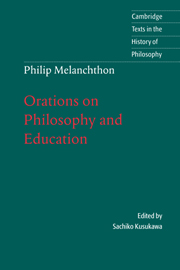
-
Select format
-
- Publisher:
- Cambridge University Press
- Publication date:
- June 2012
- April 1999
- ISBN:
- 9781139164139
- 9780521583503
- 9780521586771
- Dimensions:
- (228 x 152 mm)
- Weight & Pages:
- 0.59kg, 314 Pages
- Dimensions:
- (228 x 152 mm)
- Weight & Pages:
- 0.47kg, 316 Pages
You may already have access via personal or institutional login
Book description
Philip Melanchthon (1497–1560), humanist and colleague of Martin Luther, is best known for his educational reforms, for which he earned the title Praeceptor Germaniae (the Teacher of Germany). His most influential form of philosophical writing was the academic oration, and this volume, first published in 1999, presents a large and wide-ranging selection of his orations and textbook prefaces translated into English. They set out his views on the distinction between faith and reason, the role of philosophy in education, moral philosophy, natural philosophy, astronomy and astrology, and the importance of philosophy to a true Christian, as well as his views on Classical philosophical authorities such as Plato and Aristotle and on contemporaries such as Erasmus and Luther. Powerfully influential in their time, inspiring many Protestant students to study philosophy, mathematics and natural philosophy, they illuminate the relationship between Renaissance and Reformation thought.
Reviews
"For providing more than the title indicates, and doing so very competently, both editor and translator are to be thanked and congradulated." Sixteenth Century Journal
Contents
Metrics
Altmetric attention score
Full text views
Full text views help Loading metrics...
Loading metrics...
* Views captured on Cambridge Core between #date#. This data will be updated every 24 hours.
Usage data cannot currently be displayed.
Accessibility standard: Unknown
Why this information is here
This section outlines the accessibility features of this content - including support for screen readers, full keyboard navigation and high-contrast display options. This may not be relevant for you.
Accessibility Information
Accessibility compliance for the PDF of this book is currently unknown and may be updated in the future.


